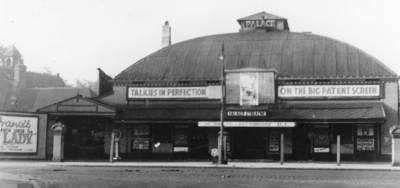Douglas Rendell (DR-95-169)

The Palace Cinema, Sale (photograph taken by Mr Rendell in 1937 or 1938)
In March 1995, Douglas Rendell contacted Cinema Culture in 1930s Britain in response to an appeal in the local press, and joined the twenty-two individuals living in the Greater Manchester area who were interviewed for the project as core informants during the summer of that year. Born in Sale, Greater Manchester in 1918, Mr Rendell was one of three children; his father was an engineer, his mother a housewife. From a small private school he went on to Altrincham Grammar School, and from there to Manchester Technical College and then Regent Street Polytechnic, London, where he studied photography. Mr Rendell had worked as a photographer all his life, including during war service in the Royal Navy. He was interviewed on 12 May and 8 June 1995 at his home in Hale, and kindly donated some of his own photographs of Hale and Altrincham, including a set of postcards of cinemas in the towns.
In his first interview, Mr Rendell names the earliest cinemas he remembers, and talks about his childhood love of cinemagoing: “I got glued at the cinema". He talks the interviewer through photographs of local cinemas and names some film stars--his favourites included Chaplin, Harold Lloyd and Buster Keaton--noting that he was just twelve years old when he first went to Manchester city centre on his own to go to the cinema. Recalling his youthful interest in the technical side of film, he mentions that he learned to use a cine camera at school. He describes the cinema owned by his grandfather-- the Queens Hall, Accrington--and details the typical cinema programme of the day. The interview closes with Mr Rendell's recollections of studying photography in Manchester and London before the war and his wartime experiences as a photographer in the Navy. Prompted by leafing through a 1930s film annual, Mr Rendell's second interview opens with a conversation about film stars and films. Recalling that his taste in films was led first by his family and then by his student peers at college, he observes that he enjoyed musicals for the dancing and the spectacle rather than for the “silly stories”. With his college friends he saw foreign and more unusual films, including the abstract animations of Len Lye, propaganda films, and the documentaries of the GPO Film Unit. Mention is made of the screenwriter Ronald Gow, who was an alumnus of Mr Rendell's school and made films with them. Later in the interview, Mr Rendell projects some early silent film reels, including items of local interest such as a children’s outing, a sports day, and a 1917 film produced by the Altrincham District War Hospital Supply Depot in conjunction with Hilaire Belloc.Interview transcript | Listing of cinemas, films and stars mentioned
Audio-synced interview (2 of 2)
Interview transcript | Listing of cinemas, films and stars mentioned
Documents, Memorabilia and Related Links
Greater Manchester home pageScan of Essay (DR-95-169PW001) | Transcript
The Queens Hall, Accrington (cinematreasures.org site)
Day trip to Mobberley, 1909 (North West film archive site)
'Listen to Britain', 1942 (YouTube)
Photographs and negatives